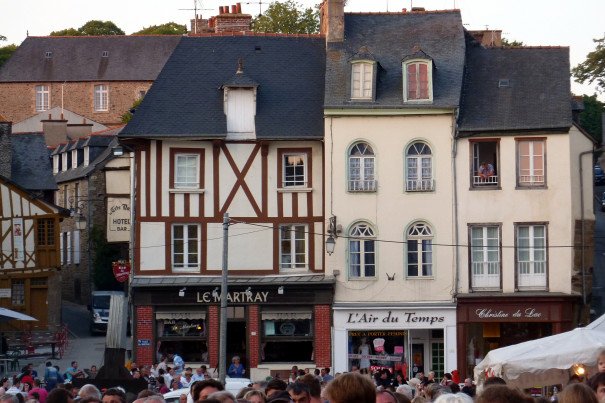
Time to Get Down to Some Nasally Fisherman Chants

Time to Get Down to Some Nasally Fisherman Chants
Kerné Cider in Le Guilvinec
It is the last week of summer, which means it is the last week of Fest Noz celebrations in Brittany, the Western arm of France.
The festive gathering—featuring dancing, eating, and drinking—is coming to a close and will be put on hold for the next nine months. I wait in line, ticket in hand, for a pint of Kerné cider to be poured into a white plastic cup, as I do every night during my summer breaks spent in the port village of Le Guilvinec.
As the sun slowly sets behind the dancing black and white Breton flag, the fishy smell of the Atlantic lingers on the main square where villagers and visitors alike are dancing—or rather, hopping and jumping, holding hands—to the sound of nasally, a cappella fisherman chants. These are unique to the region and go by the name of chants de marins Bretons, a term encompassing territory, language, music, history, and culture. To the outsider it sounds like a bunch of old men drowning to Celtic tunes, but I guess it serves as a boogie catalyst to the Breton because the moment the chants go live, everyone flocks to the dance floor.
Those who don’t take center-stage pile onto the yards-long benches chomping through a portion of moules-frites for savories, followed by a thick and airy sugar-dusted pancake-like-but-better kouign for dessert. All the while, their white plastic cups are continuously being refilled with cold, fruity cider.
Brittany is no stranger to alcohol. How could it be? It’s the region with the most bars per inhabitant in the country after Corsica. So it is no surprise that, like at all other Breton occasions, the bottles of cider come out in the hundreds, leaving half of the village tipsy by the early hours of the morning.
All of this to say that however tasteless it may seem to drink the local specialty from a white plastic cup, the Fest Noz context in which it is served stands as my excuse.
Just like Scotland and Catalonia, Brittany sets itself apart from the nation to which it is attached. This sense of identity is found not only in the dancing and the singing but also in the fizzy golden liquid that I can’t seem to stop pouring down my throat.